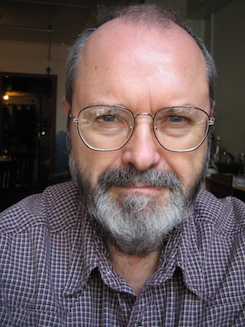Phill Niblock is a New York-based minimalist composer and multi-media musician and director of Experimental Intermedia, a foundation born in the flames of 1968’s barricade-hopping. He has been a maverick presence on the fringes of the avant garde ever since. In the history books Niblock is the forgotten Minimalist. That’s as maybe: no one ever said the history books were infallible anyway.
His influence has had more impact on younger composers such as Susan Stenger, Lois V Vierk, David First, and Glenn Branca. He’s even worked with Sonic Youth’s Thurston Moore and Lee Renaldo on “Guitar two, for four” which is actually for five guitarists. This is Minimalism in the classic sense of the word, if that makes sense. Niblock constructs big 24-track digitally-processed monolithic microtonal drones. The result is sound without melody or rhythm. Movement is slow, geologically slow. Changes are almost imperceptible, and his music has a tendency of creeping up on you. The vocal pieces are like some of Ligeti’s choral works, but a little more phased. And this isn’t choral work. “A Y U (as yet untitled)” is sampled from just one voice, the baritone Thomas Buckner. The results are pitch shifted and processed intense drones, one live and one studio edited. Unlike Ligeti, this isn’t just for voice or hurdy gurdy. Like Stockhausen’s electronic pieces, Musique Concrete, or even Fripp and Eno’s No Pussyfooting, the role of the producer/composer in “Hurdy Hurry” and “A Y U” is just as important as the role of the performer. He says: “What I am doing with my music is to produce something without rhythm or melody, by using many microtones that cause movements very, very slowly.” The stills in the booklet are from slides taken in China, while Niblock was making films which are painstaking studies of manual labour, giving a poetic dignity to sheer gruelling slog of fishermen at work, rice-planters, log-splitters, water-hole dredgers and other back-breaking toilers. Since 1968 Phill has also put on over 1000 concerts in his loft space, including Ryoji Ikeda, Zbigniew Karkowski, Jim O’Rourke.







